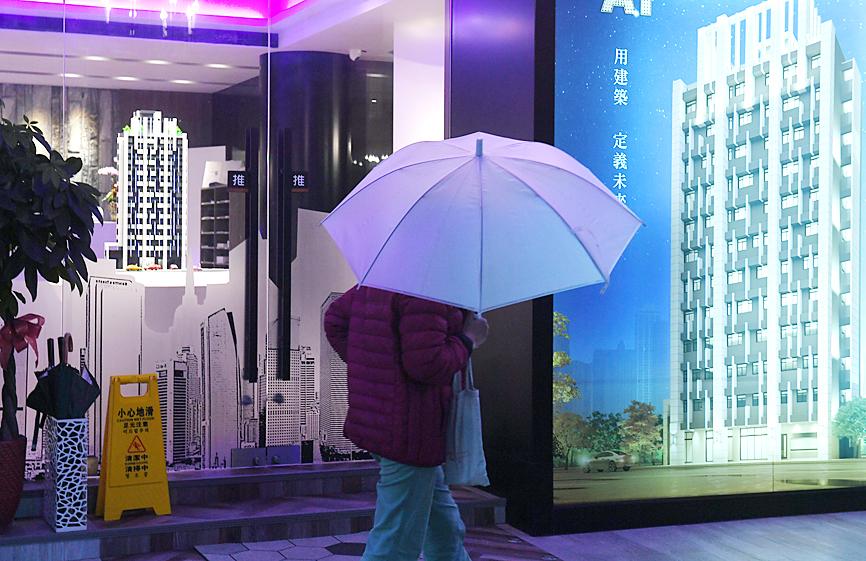About 50 percent of the public said that a local COVID-19 outbreak had reduced their income by 10 to 50 percent, severely constraining their ability to honor mortgage and credit card obligations, a survey released yesterday by Chinatrust Real Estate Co (中信房屋) found.
The survey came after the Directorate-General of Budget, Accounting and Statistics (DGBAS) last week said that the public health crisis raised the unemployment rate for May to 4.11 percent, putting 126,000 people out of work.
Last month, the situation likely deteriorated further due to lingering restrictions on movement and gatherings, the DGBAS said.

Photo: CNA
The results showed that 49.6 percent of respondents said that a nationwide level 3 COVID-19 alert had negatively affected their incomes, with reductions of 10 to 50 percent over the past two months.
Ten to 16 percent of respondents said that income erosion had made it more difficult to pay their mortgage and credit card bills.
Chinatrust Real Estate said that people should not suspend debt payments without the creditor’s prior approval, as that would damage their credit history and make dealings with the creditor more difficult.
On a NT$10 million (US$357,181) house with a 20-year mortgage at 1.31 percent interest, people typically have a monthly mortgage payment of NT$47,000, the real-estate broker said, adding that this is a heavy financial burden for homeowners who have had their hours reduced, been furloughed or lost their jobs due to the outbreak.
In May, the average take-home pay fell 12.05 percent for jobs in the entertainment and recreational sectors, 4.68 percent in the hospitality industry and up to 5.2 percent for other service-sector jobs, DGBAS data released on Monday showed.
People unable to pay their creditors should contact them and request a grace period, a moratorium or some other arrangement that could extend their overall debt payment schedule, but avoid punitive consequences, Chinatrust Real Estate said.

GROWING OWINGS: While Luxembourg and China swapped the top three spots, the US continued to be the largest exposure for Taiwan for the 41st consecutive quarter The US remained the largest debtor nation to Taiwan’s banking sector for the 41st consecutive quarter at the end of September, after local banks’ exposure to the US market rose more than 2 percent from three months earlier, the central bank said. Exposure to the US increased to US$198.896 billion, up US$4.026 billion, or 2.07 percent, from US$194.87 billion in the previous quarter, data released by the central bank showed on Friday. Of the increase, about US$1.4 billion came from banks’ investments in securitized products and interbank loans in the US, while another US$2.6 billion stemmed from trust assets, including mutual funds,

Micron Memory Taiwan Co (台灣美光), a subsidiary of US memorychip maker Micron Technology Inc, has been granted a NT$4.7 billion (US$149.5 million) subsidy under the Ministry of Economic Affairs A+ Corporate Innovation and R&D Enhancement program, the ministry said yesterday. The US memorychip maker’s program aims to back the development of high-performance and high-bandwidth memory chips with a total budget of NT$11.75 billion, the ministry said. Aside from the government funding, Micron is to inject the remaining investment of NT$7.06 billion as the company applied to participate the government’s Global Innovation Partnership Program to deepen technology cooperation, a ministry official told the

Taiwan Semiconductor Manufacturing Co (TSMC, 台積電), the world’s leading advanced chipmaker, officially began volume production of its 2-nanometer chips in the fourth quarter of this year, according to a recent update on the company’s Web site. The low-key announcement confirms that TSMC, the go-to chipmaker for artificial intelligence (AI) hardware providers Nvidia Corp and iPhone maker Apple Inc, met its original roadmap for the next-generation technology. Production is currently centered at Fab 22 in Kaohsiung, utilizing the company’s first-generation nanosheet transistor technology. The new architecture achieves “full-node strides in performance and power consumption,” TSMC said. The company described the 2nm process as

Even as the US is embarked on a bitter rivalry with China over the deployment of artificial intelligence (AI), Chinese technology is quietly making inroads into the US market. Despite considerable geopolitical tensions, Chinese open-source AI models are winning over a growing number of programmers and companies in the US. These are different from the closed generative AI models that have become household names — ChatGPT-maker OpenAI or Google’s Gemini — whose inner workings are fiercely protected. In contrast, “open” models offered by many Chinese rivals, from Alibaba (阿里巴巴) to DeepSeek (深度求索), allow programmers to customize parts of the software to suit their